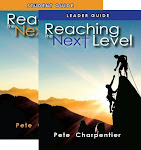
Have you ever heard of the Queen’s Baton Relay? This athletic tradition of the Commonwealth Games is amazing in terms of its symbolism and scope.
The ceremony commences at Buckingham Palace where the Queen gives a special baton containing her message to an honorary runner. The race concludes where it began as the last runner returns to the Queen who then receives the baton, removes her message, and reads it aloud to announce the start of the games.
The Queen’s Baton Relay has grown since it originated in 1958. For example, one source reports that “the Melbourne 2006 Queen’s Baton [traveled] an epic journey of more than 180,000 kilometres in a year and a day, and visited all 71 nations of the Commonwealth – home to almost one third of the world’s population.” (The above information and quote is taken from http://qbr.melbourne2006.com.au/?s=tradition.)
While we may be inspired by the symbolism and scope of this athletic tradition, every Believer throughout Church history has been a part of the King’s Relay. Jesus entrusted His message to us, His runners, and we’re racing towards the day when we’ll kneel before Him at the threshold of eternity.
While the Queen’s Baton Relay spans miles and months, the King’s relay has spanned the world over the past 2,000 years. Runners like Paul have finished the race and received their reward from the hands of Jesus (see 2 Timothy 4:7).
Of course, the Gospel baton has passed through many hands. For example, before Ignatius died for Christ in the teeth of lions, he said, “I am the wheat of Christ: I am going to be ground with the teeth of wild beasts, that I may be found pure bread.” The baton passed through the hands of Polycarp. Before he died at the stake, the aged martyr declared, “Eighty-six years I have served [Jesus], and He never once wronged me. How can I blaspheme my King, who saved me?” (Foxe’s Christian Martyrs of the World. Westwood, NJ: Barbour Books, 1985, 11.)
The King’s baton passed through the hands of Believers like John Wycliffe who labored to translate God’s Word into English in the face of great opposition. It passed through the hands of Martin Luther who refused to deny his writings and ultimately confessed before his accusers, “Here I stand, I cannot do otherwise.” (Roland H. Bainton. Here I Stand: A Life of Martin Luther. Nashville: Abingdon, 1978, 144.)
Now, Christ’s baton is in our hands. We must run the race with perseverance. While we may glance at the faithful witnesses who’ve gone before us, we cast our gaze upon Jesus (see Hebrews 12:1-2). Then one day when the race ends at His feet, we’ll hand the baton back to King Jesus. And the message we long to hear read and echo throughout the corridors of eternity is: “Well done, good and faithful servant[s]” (see Matthew 25:21, 23).
The ceremony commences at Buckingham Palace where the Queen gives a special baton containing her message to an honorary runner. The race concludes where it began as the last runner returns to the Queen who then receives the baton, removes her message, and reads it aloud to announce the start of the games.
The Queen’s Baton Relay has grown since it originated in 1958. For example, one source reports that “the Melbourne 2006 Queen’s Baton [traveled] an epic journey of more than 180,000 kilometres in a year and a day, and visited all 71 nations of the Commonwealth – home to almost one third of the world’s population.” (The above information and quote is taken from http://qbr.melbourne2006.com.au/?s=tradition.)
While we may be inspired by the symbolism and scope of this athletic tradition, every Believer throughout Church history has been a part of the King’s Relay. Jesus entrusted His message to us, His runners, and we’re racing towards the day when we’ll kneel before Him at the threshold of eternity.
While the Queen’s Baton Relay spans miles and months, the King’s relay has spanned the world over the past 2,000 years. Runners like Paul have finished the race and received their reward from the hands of Jesus (see 2 Timothy 4:7).
Of course, the Gospel baton has passed through many hands. For example, before Ignatius died for Christ in the teeth of lions, he said, “I am the wheat of Christ: I am going to be ground with the teeth of wild beasts, that I may be found pure bread.” The baton passed through the hands of Polycarp. Before he died at the stake, the aged martyr declared, “Eighty-six years I have served [Jesus], and He never once wronged me. How can I blaspheme my King, who saved me?” (Foxe’s Christian Martyrs of the World. Westwood, NJ: Barbour Books, 1985, 11.)
The King’s baton passed through the hands of Believers like John Wycliffe who labored to translate God’s Word into English in the face of great opposition. It passed through the hands of Martin Luther who refused to deny his writings and ultimately confessed before his accusers, “Here I stand, I cannot do otherwise.” (Roland H. Bainton. Here I Stand: A Life of Martin Luther. Nashville: Abingdon, 1978, 144.)
Now, Christ’s baton is in our hands. We must run the race with perseverance. While we may glance at the faithful witnesses who’ve gone before us, we cast our gaze upon Jesus (see Hebrews 12:1-2). Then one day when the race ends at His feet, we’ll hand the baton back to King Jesus. And the message we long to hear read and echo throughout the corridors of eternity is: “Well done, good and faithful servant[s]” (see Matthew 25:21, 23).




No comments:
Post a Comment